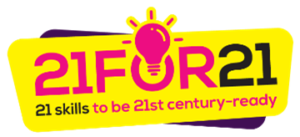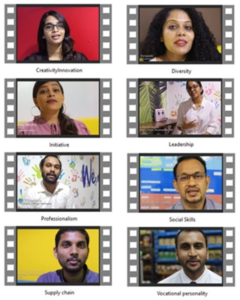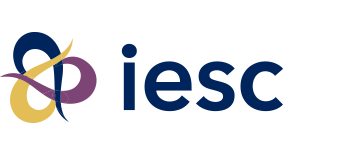USAID Leads Online Skills Development with Private Sector Collaboration
Although the Government of Sri Lanka responded swiftly and decisively to the COVID-19 pandemic, minimizing the spread of the virus in the country, the 24-hour curfews and restrictions on gatherings made in-person trainings and educational sessions impossible. In response to this challenge, USAID’s youth skills development and entrepreneurship project, YouLead, catalyzed private sector collaborations to rapidly expand its outreach to youth online. 
One such collaborative campaign, ‘21for21,’ a 21-day effort to educate youth on 21 soft skills critical to success in the 21st century, launched on July 15, World Youth Skills Day. Ultimately, the ‘21for21’ campaign reached 2.3 million people and engaged 190,000 youth through social media posts and webinars.
 The campaign began with social media posts to create awareness and then directed youth to youlead.lk/skills, a new addition to the evolving youlead.lk trilingual learning hub. On each of the 21 days, the campaign revealed a new “Skill of The Day” and provided relevant and engaging learning materials for that skill. Short videos developed in collaboration with private sector partners, such as Nestle, Airtel, Pizza Hut and Jetwing Hotels, helped highlight tips on developing the day’s skill and its relevance to the workplace.
The campaign began with social media posts to create awareness and then directed youth to youlead.lk/skills, a new addition to the evolving youlead.lk trilingual learning hub. On each of the 21 days, the campaign revealed a new “Skill of The Day” and provided relevant and engaging learning materials for that skill. Short videos developed in collaboration with private sector partners, such as Nestle, Airtel, Pizza Hut and Jetwing Hotels, helped highlight tips on developing the day’s skill and its relevance to the workplace.
Further in-depth information on these skills were provided through a series of 21 blog posts and 17 free webinars conducted in Sinhala and Tamil by professionals from the Life Skills Academy, Sasnaka Sansadaya, Nestle, and Airtel. Overall, more than 1,500 youth attended the webinars. Participant Nishanth Rajasegaram, age 23, was inspired by a webinar he attended. He said the session “…was an eye opener for me that it takes a combination of many skills to be successful at work. I can keep going back to youlead.lk and learn about these skills online, while I’m at home.”
 While the onset of COVID-19 has slowed down the economy and daily life, it has not eliminated the urgent need for work-readiness skills and lifelong learning capabilities as identified by Sri Lankan employers. Instead, it has prevented youth from accessing learning opportunities with the continued closure of training institutes. As such, young people need new ways to develop skills that will help them embark on meaningful careers and prepare them for the changing world of work, a change that COVID-19 is only accelerating. USAID’s digital skills development efforts are paving the way for the advancement of successful new channels which have made learning available country-wide to all communities—and sustainable through private sector partnerships.
While the onset of COVID-19 has slowed down the economy and daily life, it has not eliminated the urgent need for work-readiness skills and lifelong learning capabilities as identified by Sri Lankan employers. Instead, it has prevented youth from accessing learning opportunities with the continued closure of training institutes. As such, young people need new ways to develop skills that will help them embark on meaningful careers and prepare them for the changing world of work, a change that COVID-19 is only accelerating. USAID’s digital skills development efforts are paving the way for the advancement of successful new channels which have made learning available country-wide to all communities—and sustainable through private sector partnerships.

